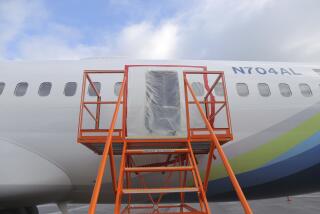Reaganâs Panel on Shuttle Blast to Meet for First Time Thursday
KENNEDY SPACE CENTER, Fla. â The presidential commission on the explosion of the space shuttle Challenger will meet for the first time Thursday in Washington to map out its strategy.
It is not clear yet how the panel will go about investigating the tragedy, but NASA officials expect most of the inquiry to be conducted in public hearings. The commissionâs immediate problem is to build a staff and find a place to hold its meetings.
Hugh Harris, head of public affairs at the Kennedy Space Center, said that the National Aeronautics and Space Administrationâs interim board of inquiry will continue gathering evidence about the explosion, but the board is no longer expected to reach definitive conclusions. The NASA board, headed by shuttle chief Jesse Moore, is expected to act somewhat as the commissionâs investigative arm.
Harris said that âthe board will present its findings to the commission,â which will make the final conclusions about what caused the shuttleâs external fuel tank to explode.
Former Secretary of State William P. Rogers will head the panel, and former astronaut Neil A. Armstrong, the first person to set foot on the moon, is the vice chairman. The commission has 120 days to present its final report to President Reagan. There will be no shuttle flights until the commission completes its investigation, and presumably some corrections will have to be made in the shuttle.
Two important scientific missions that had been scheduled for May will have to be delayed at least 13 months. Both of the missions--one European and one American--depend on the planet Jupiterâs being in a specific location in relation to the Earth, and, once the May launching window is passed, the planets will not be lined up properly again until June of 1987.
The U.S. mission, dubbed Galileo, would send a probe into the Jovian atmosphere. The European mission, called Ulysses, would loop a satellite around Jupiter and into a solar orbit, where it can study the polar regions of the sun.
The investigation jeopardizes also the launching of a space telescope in the fall. The large telescope, which is to be placed in permanent orbit above the Earthâs atmosphere, is regarded as one of the most important scientific instruments ever built.
More to Read
Sign up for Essential California
The most important California stories and recommendations in your inbox every morning.
You may occasionally receive promotional content from the Los Angeles Times.










